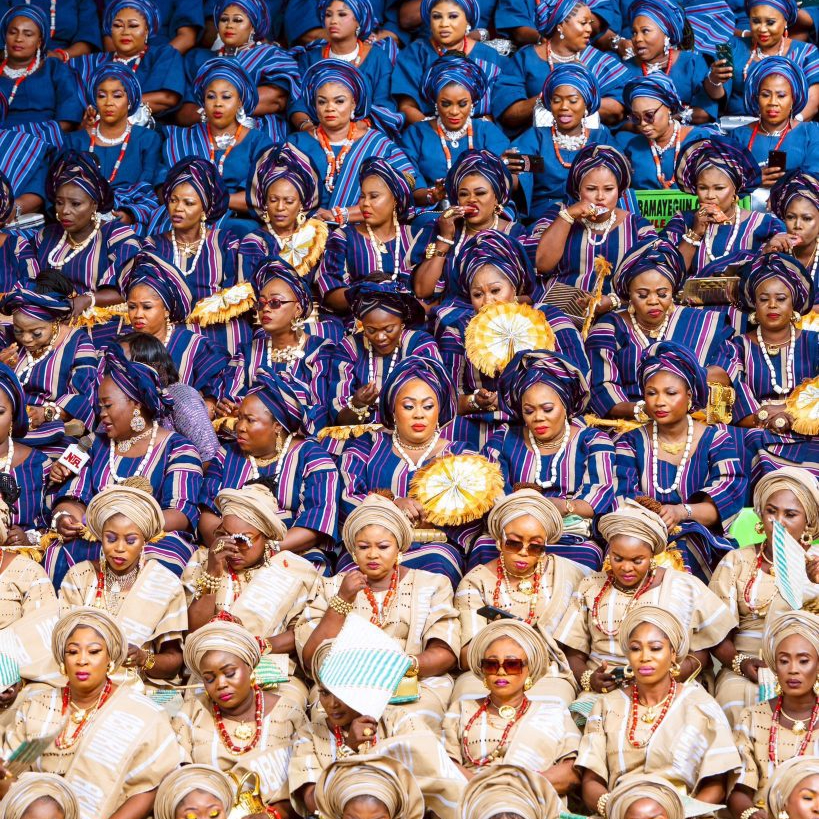A longstanding tradition in Nigeria, the aso ebi has become a vibrant cultural phenomenon that has evolved over the years, carrying deep significance for social, familial, and communal gatherings. The term “Aso ebi” literally means “family cloth” in Yoruba, reflecting its roots as a unifying symbol for families and close-knit groups during important events. However, today, its meaning has expanded, and it has become a way for people to express their identity, showcase wealth, and keep Nigerian culture alive, all while making a dazzling fashion statement.
A brief history
The Aso ebi tradition originated among the Yoruba people of southwestern Nigeria but has since spread to other ethnic groups across the country. Initially, it was a practice limited to family members who wore uniform attire to demonstrate their unity and collective identity during significant events, such as weddings, funerals, and naming ceremonies. The fabric was often made from traditional materials like ankara, aso-oke, lace, or adire, each symbolising the rich culture of the people.
In this context, the use of Aso ebi was a powerful visual cue to signify the close bond among family members. Wearing the same fabric at these gatherings fostered a sense of togetherness, distinguishing family from guests and emphasising solidarity. It was a public declaration of collective support and kinship, especially during joyful or sorrowful occasions.
While the essence of Aso ebi as a marker of unity remains, its meaning has broadened over time. What began as a simple family tradition is now a country-wide practice that transcends ethnic and social boundaries. Today, Aso ebi is no longer confined to blood relatives; it is worn by friends, coworkers, and even acquaintances to celebrate someone’s big day.
This expansion of Aso ebi has led to its role as a status symbol. The choice of fabric is no longer just about tradition but has become an expression of wealth and social standing. High-quality materials like lace, damask, and George are often used, with intricate designs and embellishments that speak to the financial capacity of the celebrant or the wearer. The more luxurious the fabric and design, the more prestigious the event is perceived to be.
For celebrants, selecting and distributing Aso ebi is an important aspect of event planning, and it’s not uncommon for people to go to great lengths to ensure that the chosen fabric is both exclusive and elegant. Guests, in turn, are expected to purchase the Aso ebi and have it tailored into eye-catching designs that reflect their personal style while adhering to the theme of the event. This practice creates an entire sub-economy within the fashion industry, driving business for fabric merchants, tailors and designers.
The Politics of Inclusion
While Aso ebi fosters a sense of unity, it also comes with its own set of challenges. The expectation that friends and family will purchase and wear the designated fabric can create financial pressure, especially when the chosen material is expensive. In some cases, the price of Aso ebi can be prohibitive, forcing people to either stretch their budgets or decline participation altogether. This can lead to feelings of exclusion or even resentment, especially in social circles where Aso ebi is seen as a mark of loyalty and friendship.
There is also a certain level of competition that comes with wearing Aso ebi. Guests often try to outdo one another in their outfit designs, with the goal of standing out in a crowd of similarly dressed people. The tailor-made nature of the outfits means that creativity and individuality play a big role, and some individuals may spend heavily on accessories and tailoring to ensure that they make a lasting impression.
However, this competitive nature of Aso ebi can also spark discussions about the commercialization of the tradition. Some argue that it has shifted from being a purely cultural practice to a display of wealth, sometimes overshadowing the very event it was meant to honour.
A Cultural Export
As Nigeria’s diaspora grows, the tradition of Aso ebi is being exported to other parts of the world. Nigerians living abroad continue to embrace the practice, wearing Aso ebi at weddings, parties, and celebrations across Europe, North America, and beyond. It serves as a way to stay connected to their roots and share their culture with others.
At Nigerian weddings in cities like London or Houston, it’s not unusual to see entire groups of people clad in brightly coloured ankara or lace, turning heads and bringing a touch of Nigeria to global celebrations. This has also led to the internationalisation of Nigerian fashion, as designers in the diaspora create modern interpretations of Aso ebi that blend traditional styles with global trends.
While its role has evolved over time, reflecting shifts in social and economic dynamics, its essence remains rooted in bringing people together. Despite the commercialisation and social pressures that have become associated with it, Aso ebi continues to play a key role in Nigerian life, whether in Lagos or London, Ibadan or Houston. As new generations embrace and redefine the tradition, Aso ebi will undoubtedly remain a vibrant part of Nigeria’s cultural landscape for years to come.
The Aso ebi tradition in Nigeria, originating with the Yoruba people, has grown into a nationwide cultural practice embodying familial unity and communal bonding through uniform attire at significant events such as weddings and funerals. Initially signifying family solidarity, Aso ebi has expanded beyond ethnic and social boundaries, becoming a symbol of social status and wealth. With high-quality materials like lace and damask often chosen for their luxurious appeal, it fosters a sub-economy in the fashion industry, involving merchants, tailors, and designers.
However, the tradition brings challenges like financial pressure on participants, potential exclusion for those unable to afford it, and a competitive spirit as guests strive for distinctive attire. This commercialization sometimes overshadows the cultural essence. As Nigeria’s diaspora spreads globally, Aso ebi is embraced abroad, contributing to the internationalization of Nigerian fashion. Despite evolving socio-economic dynamics, the tradition remains a vital aspect of Nigerian cultural life, balancing its historical values with modern influences.






